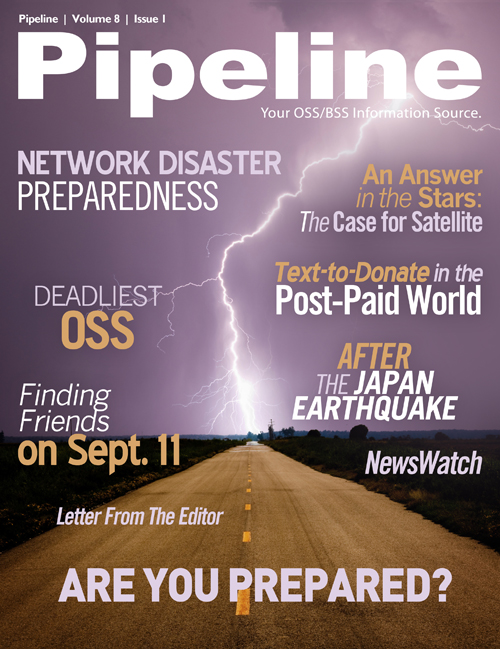When the Levee Breaks
Flood waters not only wreak havoc on homes and businesses, they also can disrupt underground networks and knock down cell towers. Recent flooding along the Mississippi River drove water levels to unseen heights, posing serious challenges for carriers. Cellular South builds towers on high platforms and employs service-area overlaps to ensure call volume is maintained even if a tower is damaged. In preparation for the possibility of a levee break, the carrier launched their Emergency Response Plan to guide deployment of resources and get fuel, air boats, and generators to compromised towers. "These steps by Cellular South will help ensure that essential communications continue for our consumer and business customers even when we experience flooding or other life-threatening situations," said Trey Howard, director of Network Operations for Cellular South.
Hurricane Season
Another good example of a disaster preparedness strategy in full effect is carrier response in anticipation of the 2011 Atlantic Hurricane Season. Sprint has invested heavily to prepare its networks for potential disaster: $21 Million in Alabama, $133 Million in Florida, $58 Million in Georgia, $35 Million in Louisiana, $5 Million in Mississippi, $17 Million in North Carolina, $17 Million in South Carolina, and a whopping $230 Million in Texas. According to their media kit, in each case Sprint is spending to provide a multitude of strategies:
- Hundreds of portable to provide power to Sprint network assets when local power is unavailable.
- Satellite Cell on Light Trucks (SatCOLTS) and Cell Sites on Wheels (COWs) to provide immediate restoration of service and to help facilitate wireless and IP communications among disaster relief and emergency response agencies.
- Experienced and well-trained technicians and engineers who can readily access and maintain the resiliency of Sprint network assets.
Sprint also has permanent generators – automatic cutover switches to immediately neutralize any loss of commercial power – installed at:
- All of its wireless and wireline switches – the network components where wireless data and calls are routed to their final destination.
- The company's network Points of Presence (POP) - the facilities where traffic enters and leaves the company's global IP network, which facilitates dedicated data services for Sprint's corporate and government customers, as well as other critical communications.
Cyclones in Joplin
Tornadoes have done serious damage in the Southern United States this year, claiming hundreds of lives. Following a recent bought of twisters in Joplin, Missouri, Verizon set up temporary cell phone towers to maintain wireless communications. According to an announcement, The Verizon Wireless Network team worked with local emergency management personnel to determine the best locations for the temporary cell towers. Additional temporary resources, including a mobile charging station and a temporary store, were also sent to the Joplin area.
Looking to the Stars for Answers
Detecon Al Saudi, a telecommunications and IT service provider based servicing Saudi Arabia and the Middle East, has taken a different approach to network preparedness. Detecon has eschewed terrestrial solutions entirely, opting to launch a satellite-based service. According to their announcement May 24, their geo-redundant satellite service will "be able to restore a customer link in as few as 120 seconds should it go down. This capability is attracting customers to adopt the service, including a prominent bank based in Saudi Arabia, which plans to back-up that nation's largest ATM network. "
It's certainly forward thinking, and may evolve into a standard solution, but whether or not the satellite can back-up huge networks is the topic for a different article. Lucky for you, we've got you covered in this issue of Pipeline: (link to Satellite article).









